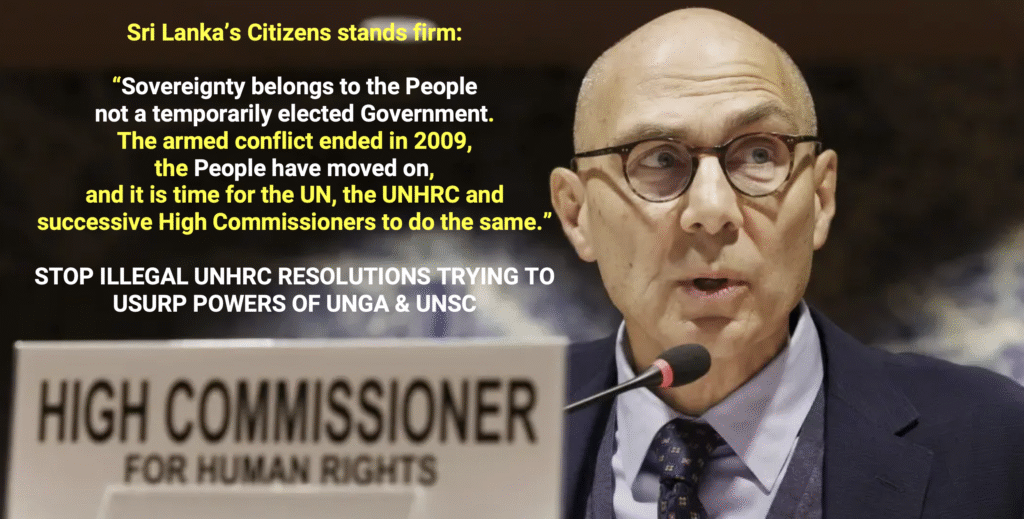Sri Lanka’s Rebuttal to OHCHR 2025 Report A/HRC/60/21
![]()

The OHCHR Report A/HRC/60/21 is illegitimate, selective, and legally void. For 30 years of LTTE terror — assassinations, suicide bombings, ethnic cleansing — the UNHRC and its High Commissioners remained silent. Only when terrorism was militarily defeated in May 2009 did Geneva suddenly awaken, not to commend Sri Lanka for restoring peace, but to criminalize the armed forces that ended terror. Sixteen years on, Sri Lanka continues to enjoy peace and development. The only parties still dissatisfied are LTTE overseas lobbies, whose demands this report shamelessly echoes. The fact that Tamil citizens in the North and East overwhelmingly voted for the former Army Commander in the 2010 Presidential Elections demonstrates reconciliation in action — a truth omitted by OHCHR.
The 11 resolutions against Sri Lanka stem from legally questionable reports (Darusman / Petrie / OISL never mandated by the UN General Assembly or the Security Council, even leaked without official adoption. The so-called OISL “investigation” itself was ultra vires, as the UNHRC has no investigatory capacity under its founding mandate.
The UN’s Office of Internal Oversight Services (OIOS) and the 5th Committee have a duty to monitor both mandate creep and financial expenditure. Their silence raises institutional accountability concerns.They have watched year after year while the HRC exceeded its authority, successive High Commissioners politicised their offices, and millions were poured into “Sri Lanka investigations” on a conflict long resolved. No answers are given on who funds these projects, which external parties drive them, and why Sri Lanka is singled out.
This undermines the credibility of the entire UN system.
In sum, this report is not about human rights. It is about weaponising Geneva for separatist and geopolitical agendas, while trampling the UN Charter, international law, and Sri Lanka’s Constitution.
UN Member States must be cautious – they could be next victims.
- Security Laws
UNHRC Demand:
Repeal the Prevention of Terrorism Act (PTA) and replace with laws meeting “international standards.”
Sri Lanka’s foreign minister is on record claiming that by end September the PTA would be repealed, opening doors to the nation being dictated by external actors.
Illegality:
- UN Charter Art. 2(7):Security & criminal law = domestic jurisdiction. UNHRC has zero mandate.
- Sri Lanka Constitution Art. 4(b):Executive power includes security & defence. Cannot be outsourced to Geneva.
- Precedent:No UNHRC demand for repeal of UK’s Terrorism Act, US Patriot Act, or India’s UAPA — selective, discriminatory.
- Hybrid Courts / Foreign Judges
UNHRC Demand:
Establish “independent judicial mechanisms” with international participation.
Illegality:
- Sri Lanka Constitution Art. 4(c):Judicial power only through Sri Lankan courts. Foreign judges = unconstitutional. Sri Lanka’s Supreme Court has consistently ruled that judicial power cannot be vested in bodies outside Sri Lanka (SC Determination 2006/2018).
- UN Charter Art. 2(1) & (7):States are sovereign & equal. UN cannot impose foreign judges.
- HRC Mandate (GA Res 60/251):HRC promotes cooperation, not imposes courts.
- Precedent:No hybrid courts imposed on US, UK, Israel, India — selective weaponization.
- ICC Referral / Universal Jurisdiction
UNHRC Demand: Support universal jurisdiction cases against Sri Lankan officials, encourage ICC involvement.
Illegality:
- Sri Lanka is not a State Partyto Rome Statute — no ICC jurisdiction. The Rome Statute is not retroactive. Even if Sri Lanka were a State Party, alleged acts before accession cannot be prosecuted.
- Customary Law:Jurisdiction requires state consent. Forcing ICC = illegal.
- UN Charter Art. 2(1):Equal sovereignty violated when Sri Lanka is singled out. In particular when conflict is over & Sri Lanka enjoys 16 years of post-conflict peace & development.
- Precedent:NATO’s Libya crimes, US invasion of Iraq — no referrals. Selective targeting.
- Demilitarisation & Land Return
By 2023, official government statistics confirmed that over 91% of land occupied during the conflict has already been released to civilian ownership and use. Furthermore, 84% of Sri Lanka’s land is vested in the State, while only around 14% is privately owned.
It has become a common practice for certain groups to misrepresent State land as “private” land in order to exert political pressure on governments to forfeit territory. Such claims must be subjected to strict legal scrutiny. Any assertion of private ownership must be supported by valid, verifiable deeds, not unsubstantiated testimonials or forged documents, which unfortunately has become a common practice.
UNHRC Demand: Immediate return of all private/public land, removal of military from North & East.
Illegality:
- UN Charter Art. 2(7):Troop deployment on national territory is sovereign prerogative.
- Sri Lanka Constitution Art. 4(b):President controls defence.
- Fact:91% land already released (admitted even by OHCHR). Report deliberately distorts.
- Precedent:No UNHRC demand for Indian Army demobilisation in Kashmir, US bases in Okinawa.
- Constitutional Reform / Federalisation
UNHRC Demand: New constitution with “power-sharing” (code for federalism).
UNHRC’s attempt to prescribe governance structures violates Art. 2(7) UN Charter — constitutional design is the sole prerogative of the People.
Illegality:
- Sri Lanka Constitution Art. 3:Sovereignty belongs to People — only they can change Constitution.
- UN Charter Art. 2(7):Constitutional design = domestic jurisdiction.
- HRC mandate:No power to dictate governance models.
- Precedent:No such demands on France (Corsica), Spain (Catalonia), UK (Scotland).
- Criminal Accountability for Sri Lankan Leaders
UNHRC Demand: Prosecute senior political & military leaders for alleged war crimes.
Illegality:
- Sri Lanka Constitution Art. 4(c):Judicial power is national, not international.
- Selective Justice:Ignores LTTE atrocities (child soldiers, assassinations, ethnic cleansing).
- UN Charter Art. 2(1):Equality of states violated when Sri Lanka alone is targeted.
- Precedent:Lord Naseby’s UK FOI documents prove civilian casualty figures inflated — ignored by OHCHR.
- Establish OHCHR Office in Sri Lanka
UNHRC Demand: Permanent OHCHR field presence to “monitor and report.”
Illegality:
- Sri Lanka Constitution Art. 3:Sovereignty belongs to People — cannot be usurped by foreign office.
- UN Charter Art. 2(7):Such intrusion violates sovereignty.
- HRC mandate:Cooperation is voluntary — cannot impose offices without consent.
- Precedent:No OHCHR offices forcibly imposed on US, UK, or Israel.
- Reparations & Victim-Centred Justice
UNHRC Demand: Expand reparations, establish new truth & reconciliation mechanisms.
Illegality:
- Sri Lanka already establishedOMP, Office of Reparations, ONUR — under domestic law.
- UN Charter Art. 2(7):Imposing additional mechanisms = overreach.
- Precedent:UN never demanded new reparations bodies for US slavery, Canadian Indigenous genocide, or Australian Aboriginals.
- Criminalization of Enforced Disappearances
UNHRC Demand: Full ratification & enforcement of CED enforced disappearances law.
Sri Lanka has signed but not ratified the CED Convention.
Ratification is a sovereign Parliamentary process under Articles 3 and 4 of the Constitution; no external body can dictate this outcome.
Under the Vienna Convention on the Law of Treaties, signing a treaty does not create binding obligations until ratified by the competent authority.
Factual Rebuttal:
Sri Lanka has already submitted the names and details of 5,000 missing soldiers to both the Office on Missing Persons (OMP) and the OHCHR/OISL mechanisms. These include names, ranks, and details of families awaiting answers.
Yet, in over a decade of High Commissioners’ reports and UNHRC debates, not a single mention has been made of these soldiers.
Selective Bias:
Instead of acknowledging the documented cases of disappeared soldiers, OHCHR reports repeatedly refer to “ghost figures” without names, ranks, or verifiable identities.
This demonstrates institutional selectivity, where only politically convenient narratives are highlighted, while verified evidence is ignored.
Illegality:
- Sri Lanka Constitution Art. 3 & 4:Ratification of treaties requires Parliamentary process. UN cannot dictate.
- UN Charter Art. 2(1):Equal sovereignty — Sri Lanka cannot be singled out.
- Precedent:India, US not pressured despite thousands of enforced disappearance allegations.
- Sanctions & Travel Bans
UNHRC Demand: Member states to impose targeted sanctions on Sri Lankan leaders.
Illegality:
- UN Charter Art. 41:Only UNSC can authorise sanctions — not UNHRC.
- Due Process:Sanctions without trial = illegal collective punishment.
- Precedent:No sanctions on UK leaders for Iraq war, Israel leaders for Gaza bombings.
Sri Lanka’s Final Position
OHCHR Report A/HRC/60/21 is ultra vires, biased, and selective.
It violates UN Charter (Arts. 1, 2, 100), GA Resolution 60/251, International Law, and Sri Lanka’s Constitution (Arts. 3, 4, 9, 76(1) – Parliament cannot delegate powers), 33(f) & (g)-President must defend the Constitution,
It ignores precedent, applies double standards, and is politically motivated while abusing the UN system.
The Government of Sri Lanka is only the custodian of sovereignty for a limited term — sovereignty ultimately belongs to the People (Constitution, Art. 3).
Across communities — Sinhalese, Tamils, Muslims, Burghers — the People seek closure and progress, not the reopening of wounds. This one-sided political witch hunt must end.
Sixteen years after terrorism was eradicated, Sri Lankans have chosen to move forward. The only actors unwilling to do so are overseas groups seeking to immortalize terrorists and recycle separatist agendas.
The UN system has far greater ongoing conflicts and humanitarian crises to address.
Sri Lanka’s case is not about human rights, but about the weaponisation of Geneva for separatist and geopolitical interests.
Sri Lanka’s Citizens stands firm: Sovereignty belongs to the People not a temporarily elected Government. The armed conflict ended in 2009, the People have moved on, and it is time for the UN, the UNHRC and successive High Commissioners to do the same.
Shenali D Waduge
Political Analyst – Sri Lanka







